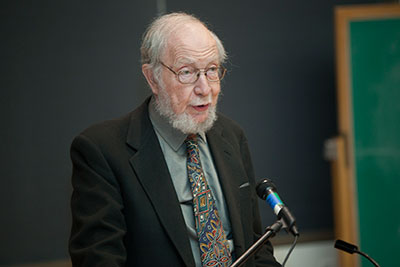Changes in study of natural history also changed poetry

As the study of natural history has changed over time so, too, have the words writers use to describe the natural world, said Lawrence Lipking, Ph.D. '62, Cornell's M.H. Abrams Distinguished Visiting Professor, in a Feb. 26 lecture, "Les mots et les oiseaux, or Words and Birds: A Natural History of Poetics."
Lipking, professor emeritus at Northwestern University, said advances in natural history changed popular perceptions toward nature, resulting in changes to the way flora and fauna were described, "forever separate[ing] words from things."
Francis Bacon, the 17th century champion of new scientific methods, deplored the power of language to distort the truth, said Lipking. "In 'Les mots et les choses' (1966), Michel Foucault described an earlier world of knowledge, in which 'nature and the word [could] intertwine with each other to infinity.' But in the 17th century things lost their magic." Lipking cited Marjorie Nicolson, an influential scholar of relations between literature and science, who called these new scientific advances and the new mindset regarding nature an "unmitigated disaster."
"But as natural history adapted to a disenchanted world, so did the language that writers put in the mouth of nature," Lipking said. A new poetic language to describe nature began to develop.
According to Lipking, birds were a topic of particular interest in this new poetry because the music they made often seemed to speak directly to people. One of the challenges writers faced, Lipking said, was the adaptation of birdsong to convey meaning, to "find words that human beings could understand."
Lipking examined the use of a variety of words to represent the sounds produced by birds and the ways these words shape connotations of the birds' songs. For example, he played a recording of "The Cuckoo Song," a 13th-century folksong. The "cuckoo" sound resonates through each line; "people singing the song can join in the joy of heralding the spring," Lipking explained.
As science continued to develop, natural history became more fact-centered and was no longer written for poets, Lipking said. But this didn't stop poets from seeking new paths to describe nature. As Lipking pointed out, "the poetry of birds, like natural history itself, is never dead."
The lecture was sponsored by the Department of English.
Sarah Byrne '15, a student writer intern at the Cornell Chronicle, contributed to this article.
Media Contact
Get Cornell news delivered right to your inbox.
Subscribe